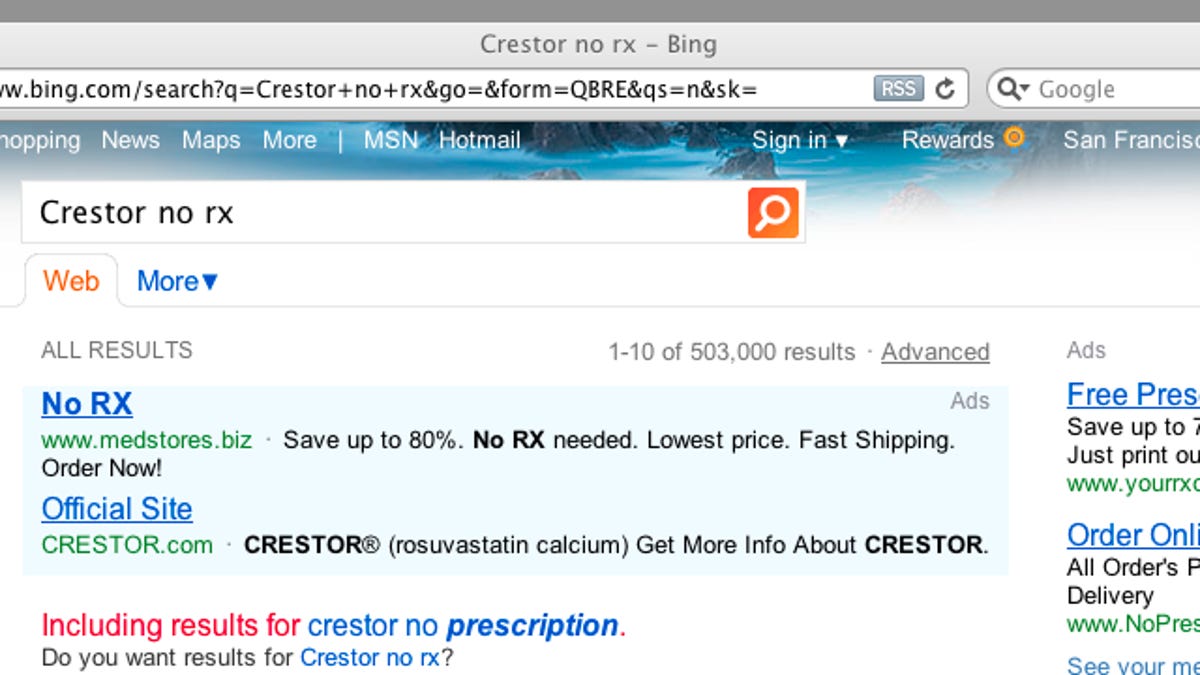More Net giants deal in shady drug ads
Microsoft, Yahoo, and IAC have accepted ads for Web sites that sell pharmaceuticals without requiring a prescription, CNET has learned, a practice that reportedly landed Google in legal trouble.
Microsoft, Yahoo, and InterActiveCorp have accepted advertisements for overseas pharmacies that sell drugs to U.S. customers without requiring prescriptions, a practice that made Google the target of a federal criminal probe, CNET has learned.
An offshore pharmacy called GoMedStore.com, which advertised on Yahoo and Microsoft's Bing.com Web site this week and appears to be based in Vietnam, boasts that it ships pills "from our India facility" in unmarked packages designed to clear U.S. Customs without raising suspicions. "Nobody will know what is inside the package," the Web site says.
Another, the Czech Republic-based iWantMeds.com, places paid listings on a U.S. product search engine operated by IAC. IAC gets paid by iWantMeds.com every time a user clicks on one of its listings for drugs including Cialis, used to treat erectile dysfunction, on its Pronto.com search site.
Google has set aside $500 million to potentially resolve an investigation by the U.S. Department of Justice into allegations it made millions by accepting ads from online pharmacies that don't require prescriptions in violation of U.S. laws, The Wall Street Journal reported earlier this month. (See related CNET coverage.)
Hundreds of offshore pharmacies sell prescription drugs, many legitimate and some counterfeit. Ones in Canada or the U.K. operate under similar laws as in the United States, meaning they tend to require a doctor's prescription. (Consumer Reports notes those options can be "less expensive" than U.S. sites for brand name medications.) Others, especially those in eastern Europe or Asia, typically don't ask for prescriptions.
The advertisements appeared on Bing.com despite Microsoft's pledge last June to accept only ads from pharmacies accredited through the so-called VIPPS program created by the National Association of Boards of Pharmacy. It's designed, the group says, to allow legitimate companies to distance themselves "from rogue sites."
"We're taking immediate steps to block this advertiser in our system as part of our continuous efforts to refine our tools to ensure these types of ads do not appear," Microsoft said, referring to GoMedStore.com. "Our editorial practices include checking whether advertisers who include pharmaceutical-related terms in ads or as keywords have obtained these (VIPPS) certifications... At no time have we been contacted regarding a government investigation into our practices in this area or the practices of others." After being contacted by CNET, Microsoft deleted those ads from Bing.
Microsoft has previously been criticized for not diligently policing offshore pharmacy ads. A 2009 report (PDF) by LegitScript, an Internet pharmacy verification service, said that 90 percent of pharmacy advertisements accepted by Microsoft that it reviewed led to "'rogue' Internet pharmacies that do not require a prescription for prescription drugs, or are otherwise acting unlawfully or fraudulently." That was followed by Microsoft's June 2010 policy change.
Similarly, a published policy for Bing Shopping, Microsoft's product search feature, claims that only "accredited" pharmacies will be listed. But searches for drugs including Propecia turn up listings for Generic4All.com, which is based in Belize.
Neither Yahoo nor IAC responded to questions. As part of a 2009 partnership, Microsoft is gradually taking over Yahoo's advertising relationships, and in return gives the smaller company 88 percent of search revenue.
Federal law does permit Americans to import drugs for their "personal medical use." But that portion of the law (21 USC 956) has not been updated to keep pace with the Internet era and it applies only to physical border crossings, not online shopping.
The FDA does, however, routinely let small shipments of prescription drugs through the U.S. mail. An FDA "compliance manual" says agency employees "may use their discretion" and allow the delivery of drugs "when the quantity and purpose are clearly for personal use, and the product does not present an unreasonable risk to the user."
Canadian pharmacies are especially attractive to bargain-minded shoppers because of price controls that can result in better deals than in the United States. The Pharmaceutical Research and Manufacturers of America, or PhRMA, is sharply critical of this practice and has lobbied to stop it. PhrMA commissioned a report saying the U.S. "risks undermining security and safety by opening" its borders to such imports, and routinely warns of the dangers of counterfeit drugs.
Scripps Networks Interactive, too, lists offshore pharmacies on its Shopzilla lead generation Web site. Searches for Propecia brought up RXshop.md, which lists mailing addresses in Greece and Latvia.
After CNET contacted Scripps Networks, which did not comment for this story, those listings for RXshop.md disappeared from Shopzilla. Scripps Networks said last month it's selling Shopzilla to Symphony Technology Group, a private equity firm.
Disclosure: McCullagh is married to a Google employee


